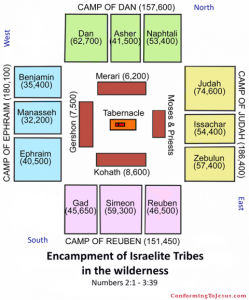Moses continues to outline the duties of the Levitical clans, which began in the last parashah. After having ordered each family of the Levites to perform their specific duties regarding the Tabernacle, Moses moves on to further outline how the camp is to be set up.
If you prefer to watch a video, click on this link: Watch the video.
The unclean were to be removed from within the camp and placed outside of it. This is to safeguard the ceremonial purity of the camp.
Next, Moses details the process for a husband who suspects his wife has been unfaithful to prove her faithful or adulterous. This involves providing a grain sacrifice and her drinking of special water, accompanied by the woman pronouncing a curse on herself if she has been unfaithful.
The instructions for taking the vow of a Nazarite are reviewed, and then in Chapter 6, verses 24-26 God tells us how he wants the Cohen HaGadol (High Priest) to bless the children of Israel, which we call the Aaronic Blessing. This is also used in Christian services, and it goes like this:
The Lord bless thee and keep thee;
The Lord make his face to shine upon thee, and be gracious to thee;
The Lord lift up his countenance upon thee, and give thee peace.
Each of the 12 tribes brings a gift for the tabernacle, which comes to a total of six covered wagons and 12 oxen. These were distributed to the Levitical families for their use in transporting the tabernacle.
The parashah ends with the people of Israel offering an additional gift, each tribe giving the exact same things in the exact same weight and number:
one silver dish and one silver basin, both filled with fine flour mingled with oil, one golden pan full of incense, one young bullock, one ram, and one he-lamb of the first year (for a burnt offering), one male goat for a sin offering, and 2 oxen, 5 rams, five male goats, and five male lambs all presented for a peace offering.
Each tribe presented their gift on a different day until all 11 tribes (Levites were excluded) had given their gifts.
Today I want to talk about the Aaronic (or Priestly) Blessing, which is so beautiful; it is both simple in its form yet complex in its meaning.
The prayer is composed of three short verses, of 3, 5, and 7 words (in the Hebrew), gradually asking first for material blessing, then a spiritual blessing, and finally for the ultimate gift from God- peace. Traditionally, the prayer is to be offered in Hebrew and only by a Priest.
As I have often stated, not all traditions are bad, and as far as this one goes I would have to say that within the Messianic community (which would include Christians who are “Born Again”) it would be OK for someone to ask a blessing from God for someone else, so long as they invoke the name of Messiah when they ask.
You see, the Jewish requirement for only a Priest to give the Aaronic Blessing is based on the need for the person offering the blessing to be not just sober, but also worshipful, faithful, ceremonially clean, and prayerful. For most people, this isn’t going to be their normal state of being.
However, for those that have accepted Yeshua as their Messiah and have the indwelling of the Ruach HaKodesh (Holy Spirit), they should “measure up” to these standards. By also invoking the name of the Messiah, any shortcomings in their holiness would be offset, so to speak, through Yeshua’s intervention.
When I have served in the position of Rabbi or Cantor (although I am not officially ordained as either) in the houses of worship which I have attended over the years, I offered this prayer in Hebrew just as it is, not invoking the name of Yeshua. I also then repeated it in English for the benefit of those who didn’t know what the Hebrew meant. I do not believe that I was doing anything wrong by omitting “In the name of Yeshua, the Messiah” because at that time, I was in the position and authority of a Cohen. However, if I was asked to give this blessing to someone on the street, I might include a “B’shem Yeshua Ha Mashiach” at the end of it, just to be safe.
The Aaronic Blessing is both a prayer and a blessing because what we are really doing is requesting God to provide the things we specify; first, we cover material needs, then spiritual needs, and finally, we ask for God’s peace of body, mind, and spirit so that we can have complete joy.
In conclusion of today’s message, let me offer this blessing to you in the name of our Messiah, Yeshua (click on the link and make sure your audio is not muted):
Thank you for being here and please don’t forget to subscribe.
I need your help in providing Bible study materials to three Messianic Synagogues in rural Uganda- please check out my funding campaign here: Help for Ugandan Messianic Synagogues.
Tonight begins Shabbat, so Shabbat Shalom, L’hitraot and Baruch HaShem!

